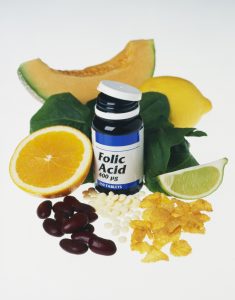Folate is a B vitamin found naturally in many green leafy vegetables, nuts, legumes, and orange juice. It is needed in the body to make and repair DNA and may play a role in protecting us against cancer. 
In 1998, the US Food and Drug Administration instituted a folate fortification program to help prevent birth defects, such as spina bifida. They used folic acid, which is the synthetic form of folate. The result was a significant drop in birth defects. But recent epidemiological data have given rise to concerns that folic acid fortification may increase the risk of colorectal cancer.
An animal study published in last month’s issue of Cancer Prevention Research suggests that the cancer-related effects of folate/folic-acid may partially be explained by when and how long you take this essential nutrient.
The researchers wanted to see what effects a diet lower in folate would have on tumor development. Folate acts by serving as a methyl group donor. Methyl groups are small molecules that can attach to DNA to influence the body’s production of proteins involved in immunity and inflammation—precursors to tumor development.
In the study, scientists studied mice that have a tendency to develop tumors in the small intestine and colon. They placed the mice into one of four groups. At the age of 5 weeks, groups one and two were fed either a diet with folic acid or without. The folic acid diet gave the mice plenty of methyl group donors; the diet lacking in folic acid was lacking in methyl donors. At the age of 10 weeks, groups three and four were also fed a diet with folic acid or without. When the four groups of mice were 16 weeks old, they were assessed for tumor development.
The mice that were fed no folic acid starting at a relatively young age showed an 80 percent reduction in the number of tumors in the small intestine compared to the mice on the folic acid diet. The colon tumors in the mice without folic acid – methyl donor deficient – were also smaller.
But when the folic acid-poor diet was initiated at 10 weeks, the protective effects were lost. These mice developed more tumors and they were larger in size when compared to the mice on the folic acid diet.
The researchers also wanted to see if the different diets affected gene activity in mice. When the animals started eating the two diets at five weeks old, the diet with no folic acid suppressed the activity of genes related to immunity and inflammation when compared to the diet with folic acid.
While this study sheds some light on how consuming relatively high amounts of foods fortified with folic acid might increase cancer risk, there are still many unanswered questions.
The research on folate and cancer risk is ongoing. Government recommendations say all women capable of becoming pregnant consume 400 micrograms of folic acid from supplements or fortified foods, in addition to the folate from a varied diet. Pregnant women should consume 600 micrograms of folate equivalent (combination folic acid and folate) daily. Daily recommendations for all other adults is 400 micrograms.
To see how much folate and folic acid spinach, breakfast cereals and other foods contains, visit this NIH site.
If you want to read more about the folate paradox, here’s a story in Cancer Research Update.
Teresa L. Johnson, MSPH, RD, is a nutrition and health communications consultant with a long-time interest in the intersection of nutrition, exercise, and wellness.





